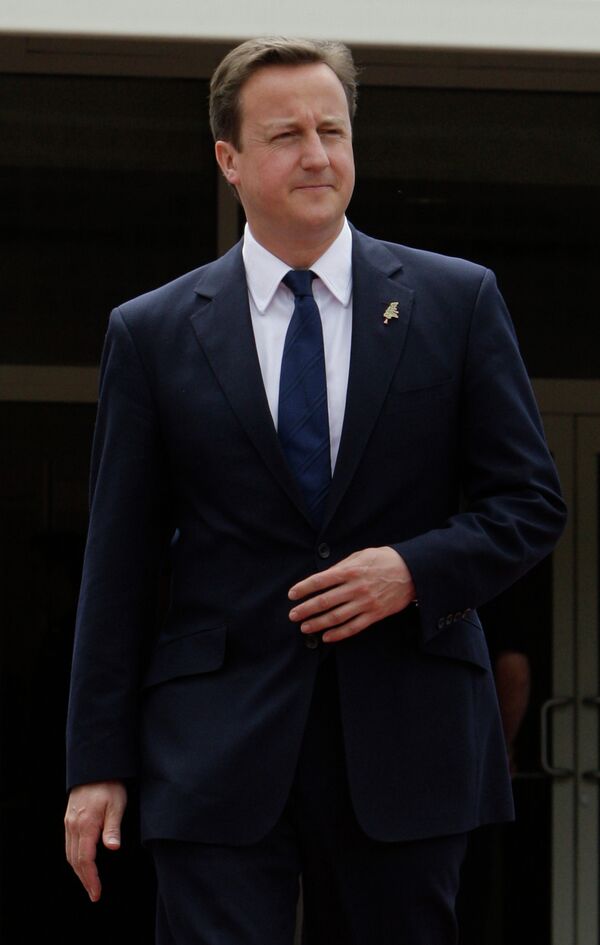Comparing how the American and British press are covering British Prime Minister David Cameron's first visit to the United States makes for some amusing reading.
The front page of The Washington Post is divided between the first installment of an investigative series on the achievements and failures of the American intelligence community post-9/11 and the latest news on the oil leaking from the contraption BP devised to try to stop the gusher. And it's no wonder: There is nothing that worries Americans more than the horrible oil spill in the Gulf of Mexico and the inability of their president - or anyone else, for that matter - to do anything about it. And just who caused the spill? BP. And what does that stand for? The P obviously stands for "Petroleum," but what about that B? Oh right, "British." And the man who just met with Barack Obama is the British prime minister? Aha...
So in the U.S. the visit was reported in the context of the BP oil spill.
Americans' hatred for that company and, by extension, for the Brits has become so intense that BP and the spill consumed David Cameron's entire visit to Washington. On that issue, Obama was on Cameron's side. After all, if compensation claims bankrupt the company, there will be no company left to pay any claims. Americans now must protect the British oil company if they want to get anything from it. The most conservative estimate of damages is currently $4 billion.
On top of that, Obama's countrymen found another outlet for their rampant British-bashing in the scandal over the release of the Lockerbie bomber last year. In 1988, Libyan terrorists blew up a plane over Lockerbie, Scotland, killing the 280, mostly American, passengers. The mastermind behind the terrorist attack, Abdelbaset Ali al-Megrahi, is terminally ill, and he was released by a Scottish court on compassionate grounds so that he could return home to die.
Where does BP come in? It just so happens that the U.S. Senate is looking into charges that BP had lobbied the autonomous Scots to set the terrorist free so that BP could sign a lucrative oil contract with Libya. And al-Megrahi is still alive, almost a year after his release.
Cameron played no part in the alleged deal. Indeed, on this point he is in total agreement with the Americans. Earlier, when Cameron's Conservative Party was still in the opposition, he said that the Lockerbie bomber must die in jail. He reaffirmed his position during his talks with Obama. When it comes to the Lockerbie bomber, both men "violently agreed," according to Mr. Cameron.
The new British PM's first visit to the United States was as stormy as it was successful, considering the circumstances. It depends on how you look at it, though. American commentators are focused on the extent to which Cameron helped BP and America, while the Brits have different concerns.
For over half a century, British prime ministers never considered going anywhere but Washington for their first foreign trip. Their "special relationship" and their role of serving as the backbone for the "Atlantic solidarity" dictated it. Britain has been the gateway between the liberal Anglo-Saxon world and the overregulated world of continental Europe.
So just what happened in America this time around? What did Obama and Cameron talk about, the latter in his role as lobbyist for the disgraced British company? Just how far does the special relationship extend?
America and Britain have a long and complex history. There is the concept of America as an alternative to colonialist Britain; the special relationship forged in the World Wars, which Britain would not have won without America's support; and a tired Britain's loss of its empire, translated into America's rise to global preeminence in the post-war period. In some sense, victorious England found itself in the same position as defeated Japan, as both countries were left without a coherent foreign policy and both were forced to accept a secondary role in the world.
The British pinned their hopes for a revival of the British spirit (and greater British influence in the world) on Labour PM Tony Blair. In their private conversations, the British speculated about the hidden agenda behind the role Blair assumed as an unquestioning ally of the United States: to civilize the Americans, to create an alliance of equals without parallel in the world. That was why he committed British troops to America's foreign escapades. But George W. Bush got in the way, and Britain failed to regain its great power status.
Cameron comes from another party, and so there were expectations that he would offer a fresh perspective on Britain's role in the world and the meaning of the special relationship. The disaster in the Gulf of Mexico has made that all but impossible now.
But is the oil spill completely to blame? Ask the Republicans and other neo-cons who oppose Obama, and they'll tell you that Obama simply has no idea what to discuss with the British prime minister or any other Europeans. They refuse to send more troops to Afghanistan (Cameron promised that the last British solider would leave by 2014). Europe does not see eye-to-eye with America on the financial sector and the economic crisis. They ask Obama, who needs Europe? What difference does Europe make to the world? What say does it have? Simply put, Obama has no Europe policy and Atlantic solidarity is on its way out.
And to cap it all off, there is the disaster in the Gulf of Mexico, a real pity. So, what can one expect?
By Dmitry Kosyrev, RIA Novosti Political Observer
The opinions expressed in this article are the author's and do not necessarily represent those of RIA Novosti.

